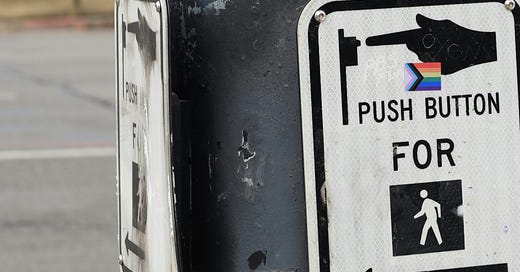On February 2, 2024, someone identifying herself as a Brooklyn mom wrote to the “The Ethicist,” Kwame Anthony Appiah’s New York Times column, agonizing about an “egregious racial stereotype of a Chinese person” in Dr. Seuss’s And To Think that I Saw it on Mulberry Street; the writer feared for her eight-month-old son. Should she just leave out the page with the Chinese person? Oh, dear.
I’ve detailed why the image is neither egregious nor a stereotype here.
I have a new stereotype, the “Brooklyn Mom,” namely the kind who sends in such worries to Appiah. The Brooklyn mom is white and so guilty about this that it doesn’t occur to her to Google the history of the supposedly offending image. One of her nightmares: her child will say, “Mommy, that man’s skin looks like chocolate!” in a supermarket within hearing of an African-American person. Brooklyn Mom doesn’t say, “right, that’s ‘cause he’s black” or any reasonable thing; she reddens, tries to hush the kid, and buckles down on checking her privilege. Her worst fear is that the kid will be a racist—the thought makes her swallow an Ativan with her oat milk latte. Another nagging fear: her brother, who is thinking of transitioning, has a beard, recently started going by they/them pronouns, and wore a pink dress to dinner. The five-year-old (even though she’s been to drag queen story hour!) said, “But Uncle Jerry, you can’t be a girl when you have a beard. Do you have a penis? Because girls don’t have them.”
The kid said that! She said that after the Brooklyn Mom read her A Book About Pronouns: What Are Your Words? and Pink is for Boys every bedtime for two weeks. At the kid’s request, too. The Brooklyn mom calls her therapist and sobs.
Like many a stereotype, there’s a grain of truth somewhere. The Brooklyn mom doesn’t understand how much her mood, rather than her words, influences her children. Once they perceive her anxiety and believe me, they see and hear everything, those little pitchers with big ears, especially the stuff you think is well-hidden, they’ll poke that bear every chance they get. There’s nothing like watching mommy throwing a screamy fit. Hee-hee. They’ll absorb her worries, though. If mom is frantic about unearthing racist feelings and appeasing somebody about them, odds are the kids will become frantic about unearthing racist feelings and appeasing somebody about them.
Brooklyn Mom, grow up! Take this from yoga class—you’re supposed to be calm. You’re a mother. Have a little self-confidence. You know perfectly well you’re not a racist. You know perfectly well your brother’s always been gay, but his friends are telling him he might be trans and since he gets a kick out of dressing up, he’s wavering. You know you’re a good, kind person and in your heart of hearts you know the only real problem is your fear of being judged by the likes of Ibram X. Kendi and Robin DiAngelo— neither of whom deserves for you to give them the time of day.
Appiah, to his credit, defended Dr. Seuss’s delightful book, mentioning that “what kids get out of books isn’t necessarily what their cultural guardians extract,” mentioning the “20-odd” rejections publishers in the 1930s gave And To Think That I Saw It On Mulberry Street, one reasoning it “lacked a message aimed at “transforming children into good citizens.” Publishers worry about what sells—in the late thirties, parents wanted good citizens. Now parents want anti-racist children who think they can select their gender identity.
In the same “Ethicist” column, Appiah confessed to having enjoyed, as a child, “a book now regarded as racially irredeemable,” namely Little Black Sambo. Little Black Sambo had “like me” brown skin, Appiah observes, but also lives near hungry tigers and “knows just how to handle them.” Exactly—all children would love to know how to handle some scary monster, and that’s one of many things making Little Black Sambo one of the greatest children’s books ever.
The current kiddy book and TV scene shows considerable misunderstanding of children and of childhood. A Book About Pronouns: What Are Your Words? features a four-year-old boy whose they/them uncle urges him to choose what gender he’d like to be that day—or that hour. The boy worries he doesn’t know what to choose—a choice he shouldn’t have to make, a choice rendering him anxious.
The poor kid. Children used to have their secrets: they might ask for information, but no matter how age-appropriate your answer, they often prefer their own.
“Why does it rain? Oh, I know, cause God’s crying and also it’s good for our plants!”
Never mind the kid-friendly explanation I’ve offered the three-year-old. The kid knows better, naturally—he had his own theories. Even so, kids know nothing and it’s easy to get them to believe you. If you tell them girls can have penises and boys vaginas before they’ve even asked you, don’t be surprised if you’ve only upset them. You want to offer them words to describe feelings they may be having, but if they’re not having those feelings (or even if they are) they may not want your words. They’d like their own—not just their own words, but their own world, separate from the world of Mom and Dad. Full disclosure: this gets much more obvious in adolescence.
The hand-wringing guilt of Brooklyn Mom would dissolve if she had any faith in her own good judgement. Otherwise, things only get sadder.




